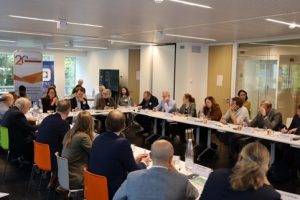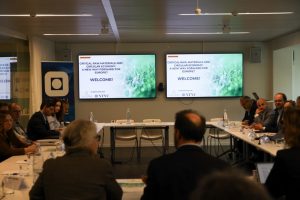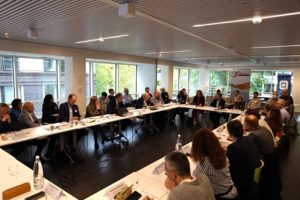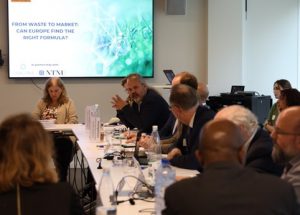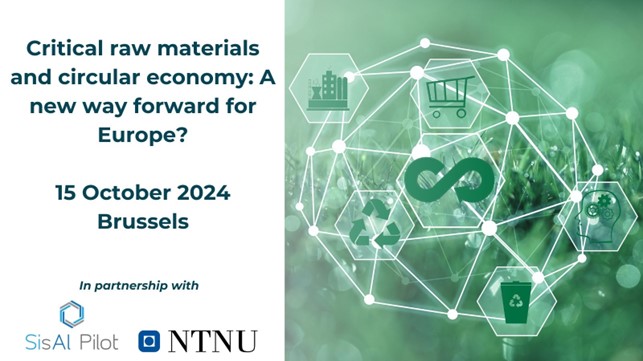“Critical raw materials and circular economy: A new way forward for Europe?”, Oct.15 – Brussels
29 Oct 2024
INTRODUCTION
The high-level round table discussion was organised in collaboration between NTNU, SisAl Pilot and Science Business. NTNU was strongly involved in the description of the concept and in the development of the agenda as well as in the invitation of participants to the round table discussion from the consortium. Science Business was responsible for drafting the documents, developing the marketing profile, inviting speakers from the European Commission, Policy makers and relevant associations to the event as well as moderating the discussion. In addition, a journalist from Science business will write an article that will be used in future communications with stakeholders by Science Buniess and the SisAl consortium.
CONCEPT
Since late 2019, the European Green Deal has been one of the defining themes of EU policy: a wide-ranging package of initiatives intended to put Europe on a path to becoming the world’s first climate-neutral continent by 2050. From the beginning, policy makers have underlined that attaining this long-term goal will depend heavily on European industry, plus other research and innovation (R&I) organisations, to lead the way – both in developing and adopting net-zero technologies, and in embracing circularity in mass production and consumption systems.
During the intervening years, various crises have revealed Europe’s vulnerabilities in global supply and manufacturing chains, not least around access to and use of critical raw materials. This has particular relevance for large-scale processing industries – such as aluminum, steel, cement and glass – which have become an international battleground for primary and secondary raw materials, as well as the location of key refining and processing facilities. Put simply, if the EU wishes to remain globally competitive and autonomous in these sectors in the years ahead, it will need to use every asset at its disposal – of which its historical excellence in science and technology is one of the most valuable.
So what can be done to make Europe more materially resilient while increasing climate-friendly competitiveness? The SisAl Pilot project is a ‘live’ case study of how industry-science partnerships can contribute – in this instance around silicon, a vital component in sectors ranging from semiconductors, steel and energy to aerospace, automotive and glass. Featuring a coalition of 22 partners funded by the EU’s Horizon 2020 research programme, the project’s strategic objective has been to scale up, demonstrate and patent a new carbon-clean technology to produce silicon and silicon alloys, along with metallurgical grade alumina (MGA) and high purity alumina (HPA).
Fundamentally, the SisAl Pilot is grounded in a novel approach to extracting these metals and alloys from quartz in slag. In basic terms, this means using secondary raw materials – such as aluminium scrap and dross – instead of high-carbon-intensity equivalents in furnace-based reduction processes. With partners having validated the solution up to TRL 7, along with product quality, environmental impact and economic parameters, the stage is now set for commercialisation and the creation of new opportunities for relevant European industries.
The results of the SisAl project are thus an entry point into a wider set of discussions: what are the most effective pathways to commercialising circular, net-zero technologies and solutions in Europe? Which levers are available to support market uptake and scaling, including ways to secure access to the primary and secondary materials on which these breakthrough technologies depend? And what else should the EU and member-states consider to increase Europe’s production capacity and valorisation of waste streams? On October 15, Science|Business – in collaboration with the SisAl Pilot consortium – will convene a select group of senior figures from the worlds of policy, industry, research and finance to address these important questions and generate recommendations for policy makers to consider as the EU prepares its next wave of R&I programmes to support climate neutrality, circular economy and competitiveness.
AGENDA
14:00 Welcome and introductory remarks
- Simon Pickard, Moderator & Network Director, Science|Business
14:05 Setting the scene: SisAl Pilot and the prospects for industrial transformation
- Gabriella Tranell, Coordinator, SisAl Pilot & Professor, Norwegian University of Science and Technology
14: 10 CRM and circularity: New mandate, new momentum for R&I?
As highlighted in Ursula von der Leyen’s political guidelines and mission letters to her prospective new college of commissioners, the next five-year policy cycle will see a major step-up in efforts to advance clean industry and circular economy in Europe. Within this context, it is clear that more effective development, valorisation and commercialisation of novel research and technologies will be central to achieving these objectives. of these goals for the EU’s wider ambitions for decarbonisation, industrial strategy, economic security and sustainability – and by extension how these may influence the future direction and objectives for research and innovation (R&I) policy and programming, both for the remainder of Horizon Europe and for its successor, FP10.
- Featuring: Rosalinde van der Vlies, Director, Clean Planet, DG Research and Innovation, European Commission
14:45 From waste to market: Can Europe find the right formula?
Under the umbrella of the anticipated Circular Economy Act, President von der Leyen highlighted the need for Europe to “create market demand for secondary materials and a single market for waste, notably in relation to critical raw materials”. Through the COVID and energy crises, Europe has recognised the risks inherent in supply chain and CRM dependency, not to mention the race for resources to lead in technology domains vital for the green transition, such as semiconductors, photovoltaics and batteries.
- Featuring: Sigurgeir Tryggvason, Chief Executive Officer, Summa Asset Management
15:25 Coffee Break
15:50 Powering ahead: What does industry need, what can policy deliver?
Given geopolitical and economic realities, the EU is in a race against time – as well as other regional blocks – to boost its industrial competitiveness and technology sovereignty, and to accelerate the green and digital transitions in a fair, inclusive way. Regardless of who is in charge, increasing Europe’s innovation performance will be critical to the next 5-year legislative period, as well as the EU’s strategic agenda for its 2028-2035 budget cycle. In the final session of the roundtable, discussions will focus initially on the links between CRM, circularity and the clean energy revolution – without which Europe’s industrial decarbonisation agenda will be exceedingly difficult to realise. Beyond that, the session will also explore other key enabling instruments and conditions for success, including business-science partnerships and investment mechanisms required to scale up novel technologies and processes in key sectors, and to keep intellectual assets in Europe. By its conclusion, the aim is to have identified a number of recommendations – for policy makers, from potential end users of these solutions – to set Europe on the path to success as the new mandate begins.
- Featuring: Paula Pinho, Director, Just Transition, Consumers, Energy Security, Efficiency and Innovation, DG Energy, European Commission
16:55 Concluding remarks
17:00 Networking reception
CONCLUSIONS
The roundtable event on “Critical Raw Materials and Circular Economy: A New Way Forward for Europe?” held on October 15, 2024, at the NTNU Brussels Office, brought together key stakeholders from policy, industry, and academia to address Europe’s strategic challenges and opportunities in the circular economy. The discussions underscored the urgency of enhancing Europe’s material resilience and industrial competitiveness through innovative, circular, and net-zero technologies. The SisAl Pilot project was highlighted as a prime example of successful industry-science collaboration, demonstrating the potential for scalable, carbon-clean silicon production.
This event was pivotal in fostering dialogue on the pathways to commercializing circular technologies and the necessary policy frameworks to support this transition. The insights and recommendations generated will inform future EU R&I programs, emphasizing the critical role of sustainable practices in achieving climate neutrality and economic sustainability. The engagement of high-level experts and policymakers underscored the event’s significance in shaping a resilient and competitive European industrial landscape.
We encourage all stakeholders to continue this collaborative effort, leveraging the momentum generated by this roundtable to drive forward innovative solutions and policies. By working together, we can ensure a sustainable and competitive future for Europe.
